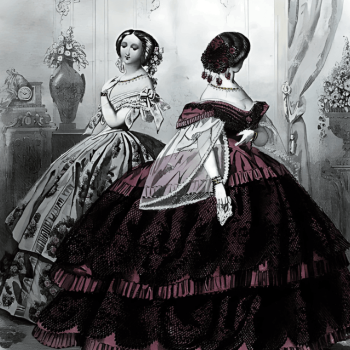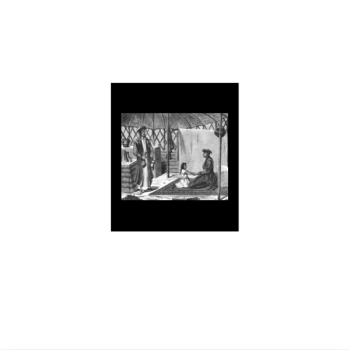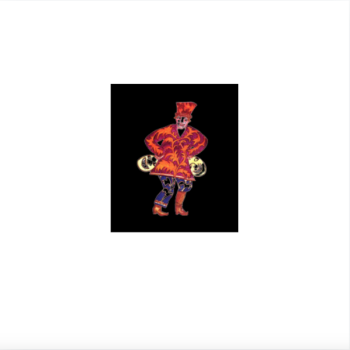CAMP
Summer 1841
The horses were now rested and prepared to make the final leg of the journey. Without waiting for any help, they pulled the party up the mountain in half an hour. The coachman spoke the truth. At the top of the mountain fields and forests stretched out before them, and among the greenery of the nearest grove, in a beautiful clearing, the white tents of Colonel Hahn’s battery were pitched. Several officers ran towards them, winded from the sprint. Some very young man got ahead of everyone, laughing and shouting something to three of his comrades who were catching up to him.
“Everyone has such cheerful faces,” Vera thought.
Helena Andreevna perked up, leaning against the window, calling them by their last names.
“Look, children!” she cried. “There! Papa running! Do you see him?”
“Where? Where?” shouted Vera.
“I see Papochka!” shouted Lelya cheerfully, clapping her hands.
“Where is he?” said Vera. “Which one?”
“How do you not see him?” laughed Helena Andreevna, pointing to a tall, fat gentleman who was the furthest behind. “Look, he’s waddling! He’s out of breath!” she joked, greeting her friends who came running to meet her.
The carriage stopped. The frontline officer quickly opened the doors, and they ran towards Colonel Hahn. “It’s been a long time since I’ve run through the mountains,” said Helena Andreevna, cheerfully.
What fun they had that wonderful evening! A house was prepared for them on the farm, but they stayed to drink tea in the camp. Everyone came running with greetings and congratulations. They set the table in front of Colonel Hahn’s tent, and everyone brought anything they were rich in—some jam, some crackers, some cream or lemon. They ordered the music to be played not far away. Everyone loved Helena Andreevna. Everyone was glad to see her return. Colonel Hahn put his overcoat under his wife’s feet so that she wouldn’t catch a cold, and kept playing with his new son, Leonid, throwing him into the air and admiring how he burst into a cheerful, ringing, laughter, getting to know his father.
While Antonia and Miss Jeffers were in charge of the tea table, Lelya and Vera managed to run into the grove with Masha and returned with bouquets, which they placed in front of Helena Andreevna. They waited for the full moon to rise, and everyone went to accompany them to the farm with music and songbooks, where a clean hut had been prepared for them. They lived there for several days, and completely exhausted their poor Englishwoman, constantly running to the camp, to the groves, and back home. Helena Andreevna was horrified by their idleness and, sighing, only talked about getting to the place as soon as possible so the children could begin their studies seriously.
“You are completely unaccustomed to lessons and have been spoiled during the journey,” said Helena Andreevna.
“Yes,” said Miss Jeffers, supporting her in a sing-song voice. “You must learn! You forget everything.”
“I didn’t forget everything!” said Vera, mimicking her. “I remember what you taught me.”
Standing in the middle of the room in a solemn pose, Vera began to touch her nose, mouth, and eyes with her index finger, saying in English: “Nose!…Mouth!…Eyes!…Chin!..”
“Well, look at the little minx!” interrupted Helena Andreevna, shaking her finger at Vera.
“Oh! Naughty little girl!” agreed Miss Jeffers.
Vera ran out of the hut, grabbed Lelya’s hand, and ran with her down the hill to their father’s tent.
Finally, Colonel Hahn’s battery came out, and they set off step by step with it. Helena Andreevna was so tired from the long journey that the doctor advised her to drive so slowly. Therefore, they drove 80 miles for two days to the place where they were supposed to live. The weather was beautiful, and they stopped to have lunch and drink tea among the oak groves, on the green grass, walked and ran a lot, and even played burners with two young officers and Antonia. Colonel Hahn even let Vera ride on his horse sometimes. This was a triumph for Vera. The soldiers walked ahead with cheerful songs; the officers rode horses, and she rode importantly with her father on his big red horse, looking cheerfully at everyone. One of the officers, seeing that she was riding with Colonel Hahn, immediately wanted to get off and put Lelya on his horse. Lelya also really wanted this! She flushed all over, and her blue eyes lit up. Helena Andreevna, however, would never allow this and even got angry with Colonel Hahn when he began to ask for it. Having learned what they were talking about, Miss Jeffers was so horrified that her white eye completely rolled back, and her dark one came right up to her nose.
“For shame, Miss Lelya! Oh, how shocking!” she screamed.
Lelya looked at her menacingly. Seeing that nothing was helping and no one was supporting her, she shook her grey hair, and out of grief began to scold Lelya in English, with Antonia in French, and with the doctor in Russian, managing to answer everyone at once. She also shouted about Vera when Colonel Hahn put her on a horse, saying that it was “shameful,” but Helena Andreevna and Antonia reassured her that she was still small. Arriving at their resting place, one of the officers taught the soldiers to shout to Vera: “Hurray! We wish good health to the new commander!” which made everyone laugh—even Miss Jeffers. Colonel Hahn kissed Vera deeply, lowering her from the horse into the arms of the orderly Voronov. She was so pleased that she did not even notice if he pricked her this time with his mustache. In the evening, on the same day, they arrived in Opishnia, a pretty village in the Poltava District, where they were to live for a long time.[1]
-
- MOTHERS & DAUGHTERS
- A LANTERN
- CHRISTENING OF THE DOLL
- DASHA & DUNYA
- GRUNYA
- NANNY NASTYA
- NANNY’S FAIRYTALE
- CONFESSION
- IN THE MONASTERY
- PREPARATIONS FOR THE HOLIDAY
- EASTER
- THE DACHA
- THE MELON POND
- MIKHAIL IVANOVICH
- THE WARLIKE PARTRIDGE
- LEONID
- NEW WINTER
- HISTORY OF BELYANKA
- THEATRES AND BALLS
- YOLKA
- REASONING
- ROAD
- CAMP
- IN NEW PLACES
- THE GRAY MONK
- VARENIKI
- THE TRIP TO DIKANKA
- WHAT HAPPENED IN THE DOLL HOUSE
- ANTONIA’S STORY
- “A WINTER EVENING”
- THE BLACK SEA
- CRIME AND PUNISHMENT
- PANIKHIDA
- PRINCE TYUMEN
SOURCES:
[1] Zhelihovskaya, Vera Petrovna. How I Was Little. A. F. Devrien. St. Petersburg, Russia. (1898): 177-182; Zhelihovskaya, Vera Petrovna. My Childhood. A. F. Devrien. St. Petersburg, Russia. (1893): 76.













